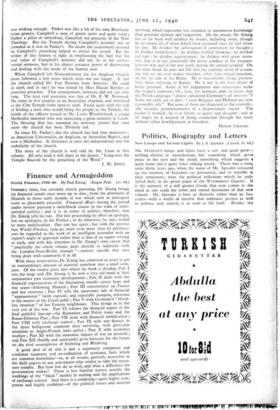Finance and Armageddon
World Finance, 1939-40. By Paul Einzig. (Kegan Paul. us. 6d.)
POSSIBLY faint, but certainly closely pursuing, Dr. Einzig brings his financial annals once more up to date ; from the aftermath of Munich to those early months of war which now in retrospect seem so pleasantly peaceful. Financial affairs during the period under review pursued a switchback course in the wake of inter- national politics ; and it is in terms of politics, therefore, that Dr. Einzig tells his tale. For this proceeding he offers an apologia, but no apologies, in his Preface ; to do otherwise, he says, would be mere stultification. One can but agree ; but with the proviso that World Finance, 1939-4o, must even more than its predeces- sors be regarded as the work of an intelligent journalist with an expert's angle of approach rather than as that of an expert writing as such, and with due attention to Dr. Einzig's own caveat that " practically the whole volume deals directly or indirectly with the London-Paris-Berlin triangle "—matters outside that area being dealt with summarily if at all.
With these reservations, Dr. Einzig has contrived as usual to get an extraordinary amount of material somehow into a small com- pass. Of the twelve parts into which his book is divided, Part I sets the stage and (Dr. Einzig is by now a very old hand at this) summarises past economic developments ; Part II deals with the financial repercussions of the fluctuating moods—peace hope and war scare--following Munich ; Part III concentrates on France and her recovery ; Part IV tells the unsavoury tale of financial "appeasement " (with especial, and especially pungent, reference to the matter of the Czech gold) ; Part V with Germany's " blood- less invasion " of her Eastern neighbours. This brings us to the very eve of the war. Part VI follows the financial aspect of the final politital line-up—the Rumanian and Polish loans and the Russo-German Pact ; Part VII deals with financial mobilisation ; Part VIII with exchange control ; Part IX with war finance in the three belligerent countries then surviving, with particular attention to Anglo-French joint policy ; Part X with economic warfare ; Part XI with the economic impact of war on neutrals ; and Part XII (briefly and cautiously) gives forecasts for the future on the rival assumptions of Sitzkrieg and Blitzkrieg.
A good deal of all this is just a supremely competent and confident summary and co-ordination of economic facts which are common knowledge—or, at all events, perfectly accessible in the daily papers to any non-expert who wishes to take the neces- sary trouble. But how few do so wish, and what a difference the presentation makes! There is less familiar matter, notably the workings of the " black " market in sterling and the implications of exchange control. And there is a rendering—again highly com- petent and highly confident—of the political forces and motives involved, which represents less common or nncommon knowledge than personal opinion and judgement. On the whole, Dr. Einzig has so far been well justified by events, including some, though by no means all, of those which have occurred since he laid down his pen. He dislikes the substitution of convention for thought ; he dislikes complacency ; he dislikes wishful thinking ; he dislikes red tape ; he dislikes equivocation ; he dislikes with great inten- sity, that is to say, practically the entire conduct of the prepara- tion for war and of the war itself, during the period covered. On the other hand, he does not fall into the contrary error of assum- ing that no one ever makes mistakes, other than ethical mistakes, on the far side of the Rhine. He is occasionally cheap, particu- larly when referring to Russia. He is not in the least afraid of being personal. Some of his judgements and conjectures make the reader's eyebrows lift ; how, for instance, does he know that the Polish campaign " almost exhausted Germany's oil reserves'? Some are sadly out of date—" even Belgium and Holland are now reasonably safe." But none of them are disguised as the scientific- ally accurate pronouncements of a dispassionate expert. The reader is warned ; he is at liberty to query and disagree ; and at all stages he is assured of being conducted through the maze without either bewilderment or boredom.
HONOR CROOME.






























 Previous page
Previous page